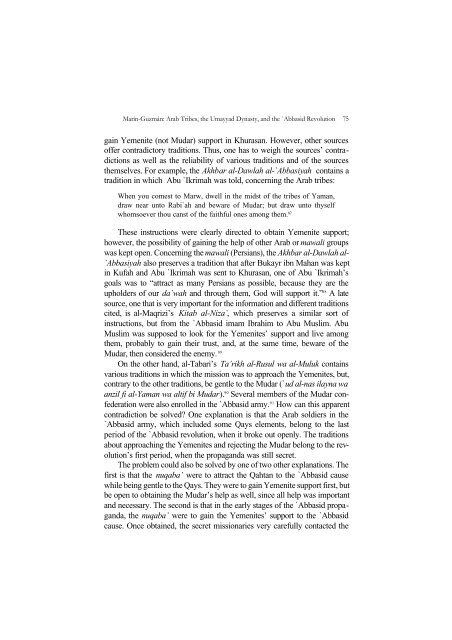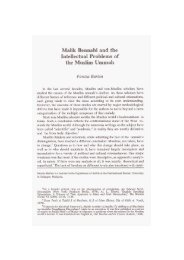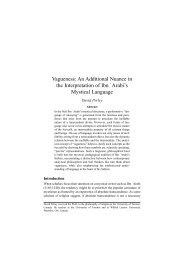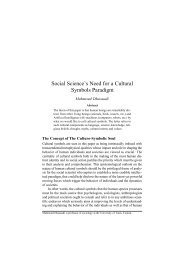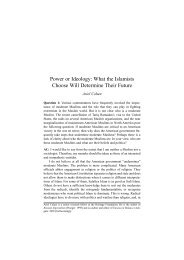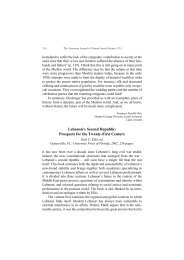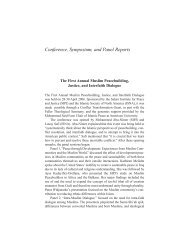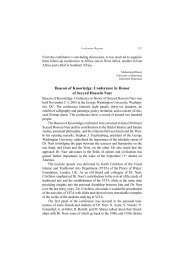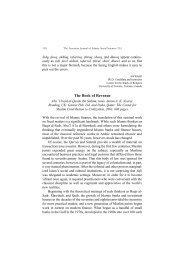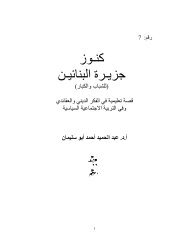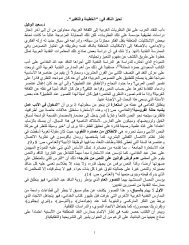Arab Tribes, the Umayyad Dynasty, and the `Abbasid ... - Epistemology
Arab Tribes, the Umayyad Dynasty, and the `Abbasid ... - Epistemology
Arab Tribes, the Umayyad Dynasty, and the `Abbasid ... - Epistemology
Create successful ePaper yourself
Turn your PDF publications into a flip-book with our unique Google optimized e-Paper software.
Marín-Guzmán: <strong>Arab</strong> <strong>Tribes</strong>, <strong>the</strong> <strong>Umayyad</strong> <strong>Dynasty</strong>, <strong>and</strong> <strong>the</strong> <strong>`Abbasid</strong> Revolution 75<br />
gain Yemenite (not Mudar) support in Khurasan. However, o<strong>the</strong>r sources<br />
offer contradictory traditions. Thus, one has to weigh <strong>the</strong> sources’ contradictions<br />
as well as <strong>the</strong> reliability of various traditions <strong>and</strong> of <strong>the</strong> sources<br />
<strong>the</strong>mselves. For example, <strong>the</strong> Akhbar al-Dawlah al-`Abbasiyah contains a<br />
tradition in which Abu `Ikrimah was told, concerning <strong>the</strong> <strong>Arab</strong> tribes:<br />
When you comest to Marw, dwell in <strong>the</strong> midst of <strong>the</strong> tribes of Yaman,<br />
draw near unto Rabi`ah <strong>and</strong> beware of Mudar; but draw unto thyself<br />
whomsoever thou canst of <strong>the</strong> faithful ones among <strong>the</strong>m. 87<br />
These instructions were clearly directed to obtain Yemenite support;<br />
however, <strong>the</strong> possibility of gaining <strong>the</strong> help of o<strong>the</strong>r <strong>Arab</strong> or mawali groups<br />
was kept open. Concerning <strong>the</strong> mawali (Persians), <strong>the</strong> Akhbar al-Dawlah al-<br />
`Abbasiyah also preserves a tradition that after Bukayr ibn Mahan was kept<br />
in Kufah <strong>and</strong> Abu `Ikrimah was sent to Khurasan, one of Abu `Ikrimah’s<br />
goals was to “attract as many Persians as possible, because <strong>the</strong>y are <strong>the</strong><br />
upholders of our da`wah <strong>and</strong> through <strong>the</strong>m, God will support it.” 88 A late<br />
source, one that is very important for <strong>the</strong> information <strong>and</strong> different traditions<br />
cited, is al-Maqrizi’s Kitab al-Niza`, which preserves a similar sort of<br />
instructions, but from <strong>the</strong> <strong>`Abbasid</strong> imam Ibrahim to Abu Muslim. Abu<br />
Muslim was supposed to look for <strong>the</strong> Yemenites’ support <strong>and</strong> live among<br />
<strong>the</strong>m, probably to gain <strong>the</strong>ir trust, <strong>and</strong>, at <strong>the</strong> same time, beware of <strong>the</strong><br />
Mudar, <strong>the</strong>n considered <strong>the</strong> enemy. 89<br />
On <strong>the</strong> o<strong>the</strong>r h<strong>and</strong>, al-Tabari’s Ta’rikh al-Rusul wa al-Muluk contains<br />
various traditions in which <strong>the</strong> mission was to approach <strong>the</strong> Yemenites, but,<br />
contrary to <strong>the</strong> o<strong>the</strong>r traditions, be gentle to <strong>the</strong> Mudar (`ud al-nas ilayna wa<br />
anzil fi al-Yaman wa altif bi Mudar). 90 Several members of <strong>the</strong> Mudar confederation<br />
were also enrolled in <strong>the</strong> <strong>`Abbasid</strong> army. 91 How can this apparent<br />
contradiction be solved? One explanation is that <strong>the</strong> <strong>Arab</strong> soldiers in <strong>the</strong><br />
<strong>`Abbasid</strong> army, which included some Qays elements, belong to <strong>the</strong> last<br />
period of <strong>the</strong> <strong>`Abbasid</strong> revolution, when it broke out openly. The traditions<br />
about approaching <strong>the</strong> Yemenites <strong>and</strong> rejecting <strong>the</strong> Mudar belong to <strong>the</strong> revolution’s<br />
first period, when <strong>the</strong> propag<strong>and</strong>a was still secret.<br />
The problem could also be solved by one of two o<strong>the</strong>r explanations. The<br />
first is that <strong>the</strong> nuqaba’ were to attract <strong>the</strong> Qahtan to <strong>the</strong> <strong>`Abbasid</strong> cause<br />
while being gentle to <strong>the</strong> Qays. They were to gain Yemenite support first, but<br />
be open to obtaining <strong>the</strong> Mudar’s help as well, since all help was important<br />
<strong>and</strong> necessary. The second is that in <strong>the</strong> early stages of <strong>the</strong> <strong>`Abbasid</strong> propag<strong>and</strong>a,<br />
<strong>the</strong> nuqaba’ were to gain <strong>the</strong> Yemenites’ support to <strong>the</strong> <strong>`Abbasid</strong><br />
cause. Once obtained, <strong>the</strong> secret missionaries very carefully contacted <strong>the</strong>


